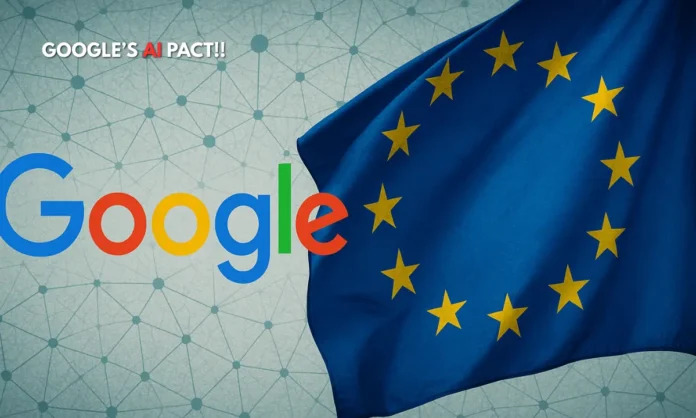Summary
- Alphabet’s Google commits to the EU Code of Practice, ensuring Google EU AI compliance with landmark AI regulations.
- Google’s chief legal officer highlights potential risks that stringent AI Act rules could pose to Europe’s global competitiveness.
- While Microsoft supports the initiative, Meta Platforms declines participation, citing legal ambiguity.
Europe’s Regulatory Push and Google’s Response
In a major move reflecting growing regulatory pressures in the field of artificial intelligence, Alphabet’s Google has officially committed to Google EU AI compliance by signing the European Union’s voluntary Code of Practice. This critical development comes as the EU positions itself to set the global standard for AI governance amid intense competition from the United States and China. The commitment to this framework underscores Google’s proactive approach toward aligning its powerful AI tools and platforms with rigorous European regulatory expectations. Kent Walker, Google’s global affairs president and chief legal officer, has openly endorsed the code while simultaneously voicing concerns regarding potential hindrances to Europe’s AI innovation trajectory.
The decision by Google to fully embrace the EU Code of Practice marks a significant milestone for Google EU AI compliance. The initiative was created by 13 independent experts to clarify legal obligations, particularly surrounding transparency, copyright compliance, and data usage in general-purpose AI model training.
So Google announced it will sign the European Union's AI Code of Practice, reversing its earlier opposition and signaling a major shift in how leading tech firms approach AI regulation in Europe.
— Rohan Paul (@rohanpaul_ai) July 31, 2025
– Google will be required to publish summaries of its model training data and… pic.twitter.com/wbeMMAqh3K
Balancing Compliance and Innovation
Google EU AI compliance aligns Google’s strategic interests with the European Commission’s ambitious AI Act, a regulation designed to foster transparency, accountability, and robustness in AI systems. However, Google’s Kent Walker has expressed apprehensions regarding certain regulatory provisions, especially those potentially stifling innovation. He specifically highlighted concerns over rules that may inadvertently expose trade secrets, prolong approval processes, or deviate from established EU copyright frameworks.
Walker’s warnings underscore a broader industry sentiment, reflecting the challenges tech giants face in maintaining competitive innovation under stringent regulatory environments. Google’s cautionary stance thus illuminates the delicate balance needed to achieve regulatory goals without hindering technological advancement and market competitiveness.
Google’s significant investments, amounting to $40 billion globally in AI development (Alphabet Annual Report, 2024), further underscore its strategic commitment to leadership in AI technologies, making Google EU AI compliance not merely a regulatory exercise, but a pivotal component of its broader global business strategy.
Contrasting Industry Positions
Microsoft, another AI powerhouse, aligns closely with Google’s stance, preparing to endorse the EU Code of Practice, highlighting a growing trend of large technology corporations prioritizing alignment with stringent EU regulatory frameworks. Conversely, Meta Platforms diverges markedly, declining participation due to unresolved legal ambiguities surrounding the AI Act.
This divergence within the tech industry reflects varying interpretations of compliance and risk management. While Google EU AI compliance indicates readiness to navigate regulatory complexities proactively, Meta’s hesitation reveals apprehension toward perceived regulatory uncertainties.
Emerging Challenges and European Competitiveness
Despite Google’s firm support for compliance, Walker’s articulated concerns around regulatory hindrances suggest potential friction points that may emerge as companies operationalize AI under the EU framework. European Parliament statements (June 2025) mandating explicit labeling of AI-generated content reflect the EU’s robust consumer-centric approach but raise questions about practical implementation, innovation pace, and global competitiveness.
According to the OECD’s 2024 AI industry report, Europe’s AI market could surpass €150 billion by 2027, contingent upon regulatory agility. Google EU AI compliance thus becomes a litmus test for Europe’s capacity to effectively balance rigorous regulatory oversight with the flexibility necessary to stimulate AI innovation and growth.
Future Implications for Google and Europe
Looking ahead, Google’s proactive stance positions the company favorably within Europe’s evolving regulatory landscape. Successful Google EU AI compliance could set a precedent, encouraging other tech giants to engage actively with regulators, fostering an environment where technological innovation and regulatory compliance coexist effectively.
Yet, the journey is not without challenges. Continued dialogue between industry leaders and European regulators will be crucial in refining regulations to ensure they foster innovation rather than impede it. The broader implications for Europe’s AI landscape hinge significantly on Google’s compliance trajectory, influencing not only corporate strategies but also future EU regulatory frameworks.
Final Thoughts
The signing of the EU Code of Practice by Google signifies more than compliance—it represents an active commitment to shaping Europe’s AI future. Google EU AI compliance, thus, emerges as both a strategic necessity and a competitive advantage, reinforcing Google’s leadership role in global AI innovation.


